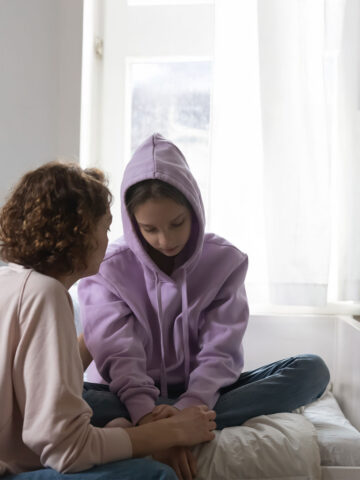By Dr. Mery Taylor, pediatric psychologist at CHOC
With schools closed and the practice of social distancing in effect, it is certainly understandable for children to feel disappointed right now about missing out on birthday parties, field trips or holidays they had been looking forward to. If your child or teen feels disappointed right now, let her express her feelings, and validate them. Share your own disappointments and how you are managing your feelings.
As a parent, it is difficult to see your child experience disappointment. As adults, we have the perspective of knowing that there will be other birthday parties, field trips and celebrations in their future. During this time, children will be most comforted by parents’ words of reassurance that you will get through these challenging times together, and that life will return to normal eventually.
Remind children why things have changed
It can be helpful to remind them about why things are different right now. Remind your child that as a community, we are coming together to “flatten the curve” and prevent the spread of COVID-19.
Discuss changes in plans earlier vs. later
For most young children, it will be helpful to start to discuss changes in plans earlier than later. Start slow and return to the topic several times, each time adding a little more detail. Ask for your children’s input on how they can still honor the event though they may not be physically able to go somewhere or have in-person interactions. For example, they can create a birthday card for a friend whose party was canceled and mail it to them and call or video chat them to wish them a happy birthday.
Limit children’s exposure to the news
At this point, children are home from school and it is clear that something has drastically changed in their world. While it is important to keep very young children away from the daily news which can include death tolls and speculations, parents should be honest about what we are trying to accomplish by social distancing. Here’s an explanation of social distancing. It could be helpful to ask them what they already know, debunk misinformation, and provide additional information for better understanding and clarification.
Advice for older children
Older children and teens are likely more aware that there are some special occasions that they many never get back, such as school dances, play performances and graduations. Assure them that their school and teacher will do what they can to make it up to them.
Let them use their imagination
Have fun thinking about what makeup birthday parties, field trips and other gatherings with family and friends would look like. Let them use their imaginations on what decorations they would have, food they would eat and people they most want to see.
Celebrate special events in a creative way
- Host a virtual party — decorate a backdrop, make a music playlist and create a themed game.
- Join friends for a virtual museum tour. Many museums and other attractions are offering free virtual visits during this time.
- Help your child prepare a special meal or dessert for the holiday or special day.
- Go into nature for a special adventure with those you live with.
- Call your friend on their birthday and sing them “Happy Birthday.”
- Share a virtual meal with friends and family.
- Host a virtual game night.
Building resiliency
Although this pandemic is not the situation that we would have chosen for our kids to face, experiencing adverse events, with their parent’s support, will help kids build resiliency. They will be able to look back on this time and reflect on how they were creative in finding ways to connect with their friends online, how they found new ways to entertain themselves at home, and how they persevered over new challenges, such as attending school online.
Get more expert health advice delivered to your inbox monthly by subscribing to the KidsHealth newsletter here.
Get mental health resources from CHOC pediatric experts
The mental health team at CHOC curated the following resources on mental health topics common to kids and teens, such as depression, anxiety, suicide prevention and more.





